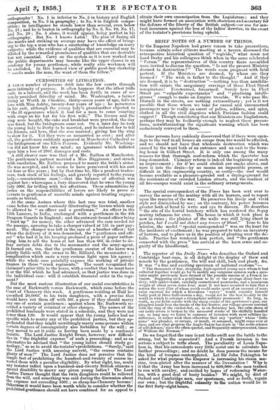CURIOSITIES OF LITIGATION.
A LAR3E number of persons drift into the law courts through mere infirmity of purpose. It often happens that the idlest trifle ends in a lawsuit, and the week has been fertile in cases of se- verely punished frivolity of mind. Mr. Washington, a farmer living at Worth in Cheshire, thirty-seven years of age, falls in love with Miss Ashby, twenty-four years of age ; he perseveres in his suit, although the young laay's grandmother objected to "the ill appearance which it had for a man to come courting with crape on his bat for his first wife." The licence and the ring were bought, the cake and breakfast were provided, the day was fixed, but the bridegroom came not. On a later day he took the young lady to Derby to be married, and he induced her to tell his Mends, and hers, that she was married ; giving her the ring to show for it. Yet they were as unmarried as ever ; and after all, the gentleman suddenly appeared in Manchester Cathedral as the bridegroom of one Ellen Pearson. Evidently Mr. Washing- ton did not know his own mind ; an ignorance which inflicted upon him a loss of 2001. damages and costs. A still clearer case was that of a Mr. Raton at Manchester. The gentleman's partner married a Miss Higginson ; and struck with emulation, Mr. Railtou proposed to marry the bride's sister. He was accepted, and he seems to have persevered with his suit for four or five years ; but by that time he, like a prudent trades- man, took stock of his feelings, and gravely reported to the young lady,—conscientious man 1—that the balance of affection was against her; whereupon a Jury discovered that he owes the young lady 5001. for trifling with her affections. These admonitions by juries on the responsibilities of lovers are likely to prove as caveats to gentlemen of unstable minds against treating engage- ments as trivial.
At the same Assizes where this last case was tried, another came before the court curiously illustrating the licence which may be allowed to "an officer and a gentleman." An officer in the 12th Lancers in India, exchanged with a gentleman in the 4th Dragoon Guards in England; and the outward-bound officer being "hard up" for money, the other advanced the sum needed for the passage, agreeing to take a charger valued at 751. in part pay- ment. The charger was left in the care of a brother officer ; but when the delivery of it was demanded, the "gentleman and offi- cer" who had it in his keeping produced a piece of paper author- izing him to sell the horse at not less than 60/. in order to de- fray certain debts due to the messmaster and the army-agent. It turned out, too, that the gentleman curator of the horse was jointly liable with the owner to Mr. Billiard, the messmaster ; a complication which casts a very curious light upon his agency ; while the whole case painfully exposes the working of private finance in these "crack regiments." The court recognized the claimant's prior title to the horse, with a verdict that he must have it or the 95/. which he had advanced, so that justice was done in the individual case : will it establish financial order in the regi- ment?
But the most curious illustration of our social eccentricities is the case of Barkworth versus Barkworth, which came before the Court of Chancery this week. A gentleman residing at Hull be- queathed 20,000/. to his twin daughters, with a proviso that would have cut them off with 50/. a piece if they should marry any one of certain gentlemen ; against whom Mr. Barkworth re- corded a variety of criminal or other charges. The names of the prohibited husbands were stated in a schedule, and they were not fewer than 120. It would appear that the young ladies had no specific wish to marry any of the prohibited parties, but they ap- prehended thatthey might unwittingly marry some persons within certain degrees of consanguinity also forbidden by the will ; so they moved to set it aside as having been made by a confessed lunatic. The Lord Justice Knight Bruce, however saw difficul- ties in "the frightful expense" of such a proceeding: and as an alternative he advised that "the young ladies should study ge- nealogy," so as to avoid thetestator sprohibitions. "Surely,h said the Lord Justice with amusing naïveté, "the census contains plenty of men 1" The Lord Justice does not perceive that the simple fact of prohibiting the hundred-and-twenty of course in- vested them with a peculiar eligibility. By what right, too, could any teatator inflict upon a hundred-and-twenty British citizens a special disability to marry any given young ladies ? The Lord Justice Turner thought that the twin daughters could be relieved from the will, and something was said during the discussion about the expense not exceeding 350/. so cheap has Chancery become! Otherwise it would have been worth while to consider whether the prohibited gentlemen should not have combined for an appeal to
obtain their own emancipation from the Legislature ; and they might have formed an association with chairman and secretary for the defence of the liberty of the British subjeet--or one for mu- tual insurance against the loss of the ladies' dowries, in the event of the testator's provisions being upheld.


































 Previous page
Previous page